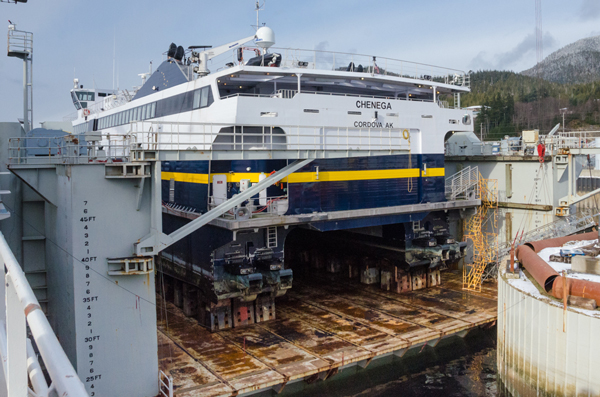
The largest labor union representing Alaska Marine Highway System workers has a tentative agreement for a new three-year contract with the state.
The Inlandboatmen’s Union of the Pacific and the Alaska Department of Administration reached the agreement last week after more than six months at the bargaining table.
The IBU represents about 650 Alaska Marine Highway System employees.
While the proposed contract does not include a pay increase in the first year, workers would get a 1 percent raise in year two and a 2 percent increase in year three. Some employees would get additional increases to make their wages more competitive with other jobs in the maritime industry.
IBU Regional Director Ricky Deising says the union’s negotiating team believes it’s the best possible deal and is urging members to ratify it.
We fought for almost seven months to get fair treatment for our members and we believe that’s what came out of this negotiation,” Deising says.
The state backed off a controversial proposal to change how the cost of living differential is calculated for ferry workers who live in Alaska. Those employees currently get an in-state salary adjustment based on Seattle wages. The state wanted to change the base city to Anchorage for all new employees hired after the start of the contract.
During this past legislative session, the IBU and other maritime unions came out strongly against a bill that mirrored the state’s position. The legislation, Senate Bill 182, did not pass.
“We weren’t willing to back off and allow future work to be paid less,” Deising says.
The two sides agreed to freeze the cost of living differential for the duration of the contract, meaning employees won’t get any additional geographic adjustment as part of the negotiated wage increases.
Administration Commissioner Curtis Thayer says the state is trying to keep the cost of running the marine highway system in check. The state operating subsidy averages more than $100 million a year, according to recent financial reports for the agency.
“So when you have one sector of state government costing potentially a billion dollars in less than a decade, then there has to be a look for savings,” Thayer says. “And anytime that you’re negotiating wages and benefits that’s one of them.”
Last month, IBU members voted overwhelmingly to authorize a strike if negotiations failed. Thayer says the vote wasn’t much of a factor in reaching the tentative agreement. Deising says it was a show of solidarity, but the union never threatened to strike and had hoped to avoid one.
“The bottom line I believe is the state understood they needed to come to an agreement to take care of their employees,” Deising says.
The state is still negotiating with the other two unions representing ferry workers: the Marine Engineers Beneficial Association and the International Association of Masters, Mates and Pilots. Thayer says the state won’t budge much from the deal struck with the IBU.
IBU has set the stage, and we’re not going to differ much for those two unions,” Thayer says.
The current contracts for all three unions expire June 30. Now that IBU has a tentative agreement, Deising says its members will continue working under the current contract. He expects a ratification vote to take place in the next two months.
The Alaska Legislature must approve the financial terms of the contract.
Editor’s note: This story has been updated to clarify Ricky Deising’s comments about the strike authorization vote. A previous version stated Deising did not think the strike authorization was much of a factor in reaching the tentative agreement. In fact, he said it was a show of solidarity.
Casey Kelly is a reporter at KTOO in Juneau.




